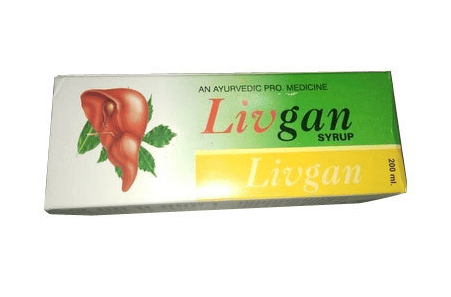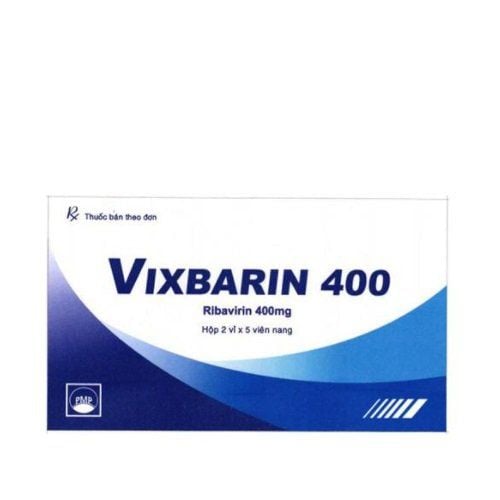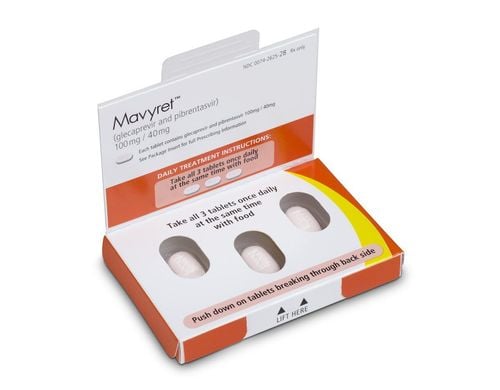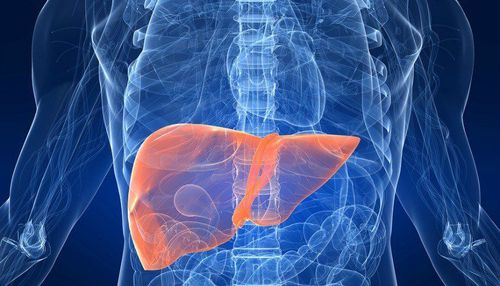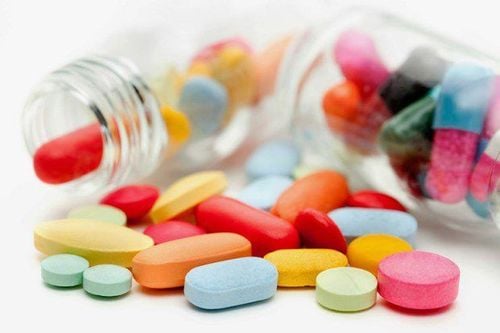This is an automatically translated article.
Prevention of viral hepatitis gives better results than treatment when infected. Preventive measures include avoiding exposure to the virus, using antisera when there is a risk of exposure, and vaccination.1. What is viral hepatitis?
Hepatitis (or viral hepatitis) is an infection of the liver caused by viruses that have a affinity for liver cells.
Most cases of viral hepatitis are caused by one of the following five causes: virus A, virus B, virus C, virus D, virus E.
Viral hepatitis causes the disease burden morbidity, mortality, and the potential for outbreaks and epidemics. In particular, hepatitis B and C are the most dangerous because this is the main cause of chronic hepatitis, cirrhosis and liver cancer.
2. Is viral hepatitis dangerous?
The majority of patients with viral hepatitis have a good prognosis, however, this varies according to the viral agent.
Symptoms of viral hepatitis such as fatigue, loss of appetite, nausea and jaundice usually subside after a few weeks to months without any specific treatment. In fact, most people with acute hepatitis A and most adults (more than 95%) with acute hepatitis B recover completely. This may be because the hepatitis virus has been completely eliminated from the body by the immune system, causing the hepatitis to subside, or the patient has immunity to the virus itself.
However, not every patient with viral hepatitis will recover completely.
5% of people with acute hepatitis B and 60% of people with acute hepatitis C will progress to chronic hepatitis. Patients with fulminant hepatitis (about 0.5% to 1%) have a mortality rate of up to 80%. Chronic hepatitis C is the leading indication for liver transplantation. Patients with chronic liver disease have a worse prognosis because of a higher risk of progression to cirrhosis, liver failure, liver cancer, and possibly death. The liver has the function of eliminating toxins and this function declines when a person has an acute or chronic hepatitis infection. In order to have a good prognosis, patients should avoid agents that can adversely affect liver function such as alcohol, tobacco, drugs that need to be metabolized in the liver,...
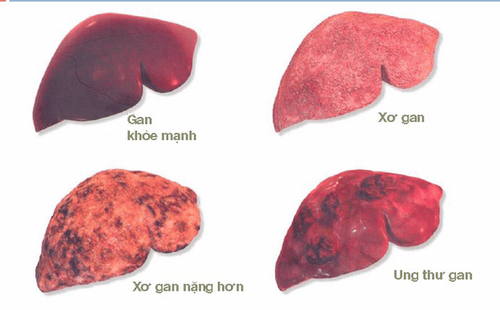
Viêm gan siêu vi lâu ngày có thể gây xơ gan, suy gan, ung thư gan cao hơn và có thể tử vong
3. How to prevent viral hepatitis?
Hepatitis prevention includes avoiding exposure to the virus, using antisera when there is a risk of exposure, and vaccination.
Avoid exposure to the virus Use serum when there is a risk of exposure : Antisera injections are called passive immunity because the injector receives antibodies from someone already infected with the hepatitis virus. Vaccination: Vaccination is called active immunity because the virus has died or a non-infectious component of the virus is introduced into the body to stimulate the immune system to produce antibodies. 3.1 Avoiding exposure to the virus Prevention of viral hepatitis gives better results than treatment when infected. It is necessary to avoid contact with some fluids and substances that may contain viruses such as:
Blood of other people: dirty needles Semen: unsafe sex, contact with semen of an infected person Other secretions: faeces, vomit,... 3.2 Immunoglobulins Serum Immune Globulin (ISG)
Is human serum containing antibodies to hepatitis A virus. Used to prevent disease in people who have been exposed to HAV, It takes effect immediately after entering the body and has a protective effect for several months. ISG is often used for travelers to HAV endemic areas or have close contact with people infected with hepatitis A virus. Relatively safe, with few side effects. HBV-Specific Globulin or HBIG
Human serum containing antibodies to HBV. HBIG is made from plasma with a high concentration of HBV antibodies. If administered within 10 days of exposure to the virus, HBIG is almost always successful in preventing disease. Even later than this, HBIG can still alleviate HBV infection. Protective effect lasts 3 weeks. HBIG is also given to infants whose mothers are infected with HBV. In addition, HBIG is given to people exposed to HBV through unprotected sex or to healthcare workers who have had a needlestick accident that contaminated the patient's blood.
3.3 Hepatitis Vaccines Hepatitis A Vaccines
Hepatitis A vaccines contain inactive (dead) hepatitis A virus. The recommended dose in adults is 2 doses (nasal) of the vaccine. After the first dose, protective antibodies develop in 70% of people who receive the injection within 2 weeks, and close to 100% by week 4. After receiving 2 doses, immunity against HAV infection persists for many years.
Hepatitis B vaccine
Hepatitis B vaccine, which contains harmless HBV antigens, stimulates the body's immune system to produce antibodies against the surface antigens of HBV.
Current good vaccines are synthesized by recombinant DNA technique, containing only the surface antigen of the virus that has the strongest effect in stimulating the body to create antibodies. They do not contain components other than surface antigens, so they cannot cause HBV infection.
The vaccine should be given 3 times, the 2nd dose 1-2 months after the first dose, the 3rd dose 4-6 months after the first dose. To ensure the best effect, the vaccine should be injected into the shoulder muscle.
Hepatitis B vaccine is 95% effective in healthy adults. The remaining 5% of vaccinated people did not achieve effective antibody levels to prevent HBV after 3 doses of vaccine. Immunocompromised patients, the elderly, and those on hemodialysis are more likely to be unresponsive to vaccines.
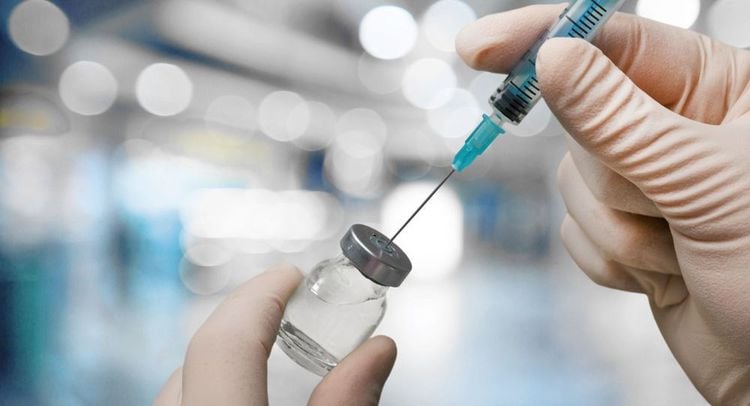
Tiêm Vaccine giúp phòng tránh bệnh viêm gan siêu vi
All pregnant women should have a blood test for antibodies to HBV surface antigen. People who test positive for this test are at risk of passing the virus on to their baby during birth, so infants born to mothers with HBV infection should receive HBIG and the HBV vaccine soon after birth. The reason for these two doses is that while the HBV vaccine has a long-lasting and active effect, its effects can only be seen after a few weeks to months. Until then, the short-acting passive antibody of HBIG will protect the baby.
Hepatitis C and D
Currently, there is no vaccine for hepatitis C. Development of this vaccine is difficult because there are 6 different types (genotypes) of HCV. Similarly, there is no vaccine to prevent hepatitis D. However, the HBV vaccine can help prevent hepatitis D because the hepatitis D virus relies on HBV to multiply in the body.
Currently, Vinmec International General Hospital has Hepatobiliary Screening packages, which help detect Hepatitis Virus at an early stage even when there are no symptoms. In addition, the comprehensive hepatobiliary screening package helps customers:
Assess the liver's ability to work through liver enzyme tests; Evaluation of bile function; vascular nutrition; Early screening for liver cancer; Perform tests such as Total blood cell analysis, blood clotting ability, screening for hepatitis B, C; Assessment of hepatobiliary status through ultrasound images and diseases that have the potential to affect liver disease / make liver disease worse; In-depth analysis of parameters to evaluate hepatobiliary function through laboratory and subclinical; the risk of affecting the liver and early screening for hepatobiliary cancer.
Please dial HOTLINE for more information or register for an appointment HERE. Download MyVinmec app to make appointments faster and to manage your bookings easily.




